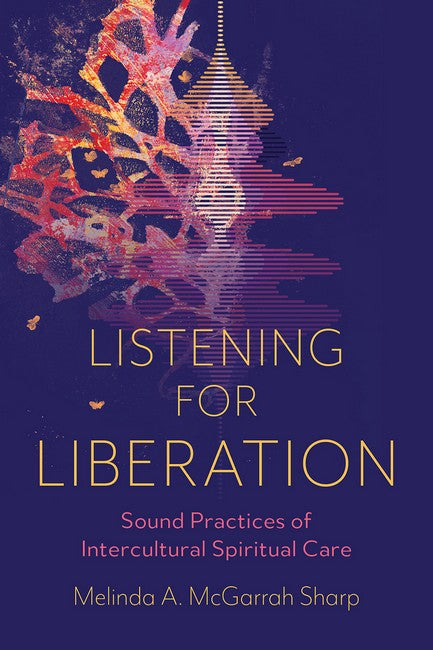A leader in pastoral theology and spiritual care's intercultural paradigm, Mindy McGarrah Sharp has taught for fifteen years at Phillips Theological Seminary and Columbia Theological Seminary. Dr. Sharp has published Misunderstanding Stories: Toward a Postcolonial Pastoral Theology; Creating Resistances: Pastoral Care in a Postcolonial World; and several book chapters, journal articles, and blogs. She lives in Decatur, Georgia, with her family.
Description
Introduction The introduction argues that decolonial spiritual care almost always recommends cultivating deep listening practices. The introduction summarizes the book's organization that moves from (1) listening resistances to (2) intercultural acoustics to (3) decolonial listening to (4) sound practices of listening for liberation. Finally, the introduction summarizes the book's offering of a decolonial approach to listening that will have significant impact on the formation and care habits of care leaders, spiritual caregivers, and teaching listening in spiritual care. Part 1: Listening Difficulties This section describes three predictable factors that make it difficult to sustain intercultural listening as a lifelong process. Further, these chapters underscore how listening ever only occurs in fragments of time and glimpses of stories. In addition, listening for liberation is a fragmenting listening: believing and breaking down what harms while creating bit by bit. Chapter 1: Listening Resistances This chapter identifies three interlinking resistances to listening: shame, which pulls individuals into themselves; shade, which pits communal identities against each other; and secrets, which perpetuate systemic practices of inequitable access to being heard. Shame, shade, and secrets signal intrapsychic and interpersonal patterns of harm that make listening difficult. Chapter 2: Misunderstanding Listening This chapter examines dynamics of listening that engage rather than try to solve intercultural misunderstandings in a postcolonial world. It outlines patterns of predictable postcolonial intercultural misunderstandings and advocates for listening practices that can and must endure such misunderstandings. The chapter also signals patterns of intercultural harm that can make listening difficult. Chapter 3: Hearing Losses This chapter acknowledges the role that grief, particularly compounded ungrieved losses, plays in pitfalls and possibilities around deep listening. Part 2: Intercultural Acoustics This section locates deep listening in intercultural acoustics. Such an understanding departs from talking about listening as an interpersonal task that can be completed: I listened; I was heard. Placing the interpersonal dynamics of listening in expansive networks of intercultural acoustics leads to listening more deeply. The three chapters of this section engage interdisciplinary conversation partners to imagine different registers of intercultural acoustics that shape listening practices today. Each chapter draws on acoustics studies, including sound engineering as well as physical, performance, geographical, and environmental acoustics, to propose a thickly textured intercultural acoustic environment in which all interpersonal listening occurs. Chapter 4: Embodied Attunement In conversation with disability theologies and trauma-informed spiritual care, this chapter engages the role of bodies in listening beyond biological hearing alone. Chapter 5: Confluent Listening In conversation with postcolonial and liberation theologies, this chapter proposes confluence--a dynamic flowing together that appropriately blurs dichotomies of speaker and listener, of listening episode and context, of verbal and non-verbal processing--as an intercultural spiritual approach to listening. Chapter 6: Sound Structures In conversation with indigenous reparations, this chapter proposes three intersecting metaphors--soundscapes, acoustic shadows, and enclosures of in/vulnerability--for locating listening in larger systems and structures of sound. Part 3: Decolonizing Listening This section focuses on two intersecting contexts of listening: (1) postures and commitments a person, community, and institution bring to the process of listening and (2) arrangements of time and space in which listening unfolds. The three chapters of this part are shaped by a commitment to decolonizing intercultural spiritual care to envision listening practices accountable to this commitment. Chapter 7: Decolonizing Listening Drawing on immersion pedagogy, this chapter expands psychological and pastoral theological definitions of listening, locating devotional and interpersonal listening practices in decolonial commitments. Chapter 8: Decolonizing Deep and Wide Drawing on indigenous soundscapes, poetry, and Wesleyan theology, this chapter knits together surface and in-depth contexts of decolonial listening practices. Chapter 9: Decolonizing In Between Drawing on queer listening literature, this chapter acknowledges listening contexts beyond borders and binaries, in between surfaces and depths. Part 4: Liberating Listening This section proposes three foundational skills and practices of listening for liberation. Listening for liberation is a group project with all the tensions, unexpected aha! insights, and sheer humanness that any messy group project embodies in this achingly beautiful world. Chapter 10: Sound Moves This chapter focuses on the role of collective attunement practice. Drawing on the author's four decades of tap dance in conversation with disability theology, this chapter proposes rhythmic attunement as a dynamic, responsive, unfinalizable practice of listening for liberation. Chapter 11: Sound Power This chapter outlines a practice of mapping power and voice throughout a polyvocal listening conversation in listening groups of any size. Drawing on dialogical Harkness pedagogy, this chapter proposes sound power as a starting point and practice in honing listening skills to conversational and contextual dynamics. Listening for liberation is justice work that awakens to possibilities and perils of power in relation to listening. Playing off of the concept of feedback that occludes reception of amplified or zoom-meeting sound Chapter 12: Sound Feedback This chapter focuses on teaching and learning decolonial listening for liberation. This, too, is a group project. There is no solo student nor one master teacher. Each person is both, and each mode is collective. Once we become attuned to flows and structured, stagnant concentrations of power, sound feedback is a needed response. Drawing on a creative pedagogy model from dance choreography called the creative response process, this chapter proposes sound feedback as a pedagogy of practice that can be implemented in any listening relationship.

